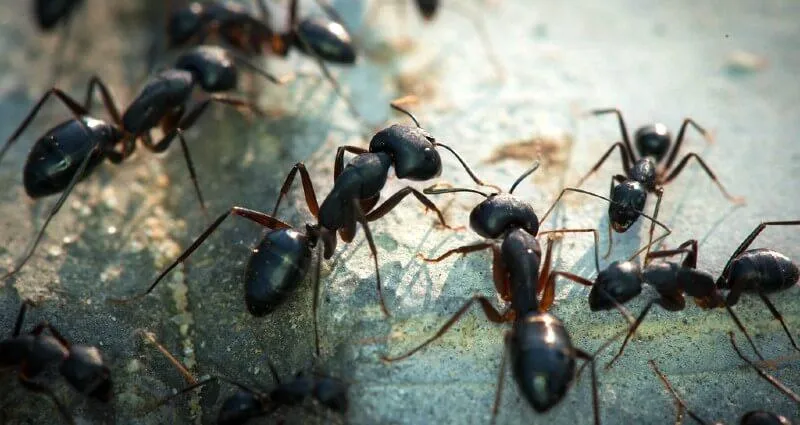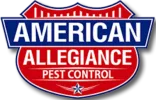American Allegiance Pest Control
Blog

Dealing with Ants and Roaches: Long-Term Control for Lee County Homes
Introduction
Ants marching across your kitchen counter. Roaches scuttling under the sink at night. For homeowners in Lee County, these pests are more than disgusting—they can persist indefinitely unless you act with strategy.
In this post you’ll learn what makes ants and roaches especially hard to eliminate in this area, what signs to watch for, and what long-term strategies will help keep them out for good.
Why Ants and Roaches Are Persistent in Lee County
Lee County’s climate and environment make it a favorable place for ants and roaches:
Warm, humid weather year-round supports insect survival and egg development.
Frequent rains provide moisture and water sources inside and outside homes.
Dense landscaping, mulch, debris, and cracks in foundations or siding provide hiding spots and entryways.
Indoor kitchens, bathrooms, garbage, pet food, and even moisture inside walls or under sinks give food and water.
Knowing what drives infestations helps you target solutions, not just treat the symptoms.
Long-Term Control Strategies
Here are core, sustainable steps that homeowners should follow. They go beyond spraying and offer real prevention.
1. Remove attractants & food sources
Keep food in sealed containers, fix leaks, clean up crumbs immediately, store pet food properly.
2. Seal entry points
Inspect doors, windows, pipe penetrations, gaps around cabinetry, cracks in foundation. Use caulk, weatherstripping, steel mesh or other durable materials.
3. Control moisture
Reduce humidity in bathrooms and kitchens with vents or dehumidifiers, fix roof leaks, ensure proper drainage away from the house.
4. Maintain landscaping
Keep plants trimmed away from siding, remove mulch touching foundations, clear debris and leaf litter, avoid wood piles or loose boards near the house.
5. Use proper baiting & monitoring systems
Place bait stations or gels in trouble areas (kitchens, bathrooms, crawlspaces). Monitor roach activity (sticky traps) and ant trails so you can reapply or adjust strategy.
6. Apply perimeter treatments
Treat around the outside of the home—foundation, windows, door frames—with residual insecticides or barrier products. Reapply as needed, especially after heavy rain.
7. Use professional integrated pest management (IPM)
This includes inspection, combining chemical and non-chemical methods, regular follow-ups, and exclusion services. A pro will help design a plan tailored to your home’s construction, landscaping, and pest pressure.
8. Keep a schedule
Even when things seem under control, stick with seasonal checkups or quarterly services. Preventative maintenance is cheaper than catching reinfestation later.
Signs That Control Measures Are Needed or Failing
Watch out for these indicators that ants/roaches have reestablished or that your current control isn’t working:
Increased sightings in multiple rooms
Trails of ants (especially leading to food or water)
Roach egg casings or roach droppings in corners, cabinets, or baseboards
Roaches seen during the day (often a sign of heavy infestation)
Persistent moisture problems (leaks, standing water)
New entry points appearing (cracks, gaps)
Frequently Asked Questions
Is DIY enough to control ants and roaches long-term?
DIY helps for small infestations or maintenance. But for ongoing problems, professional help with inspection, exclusion, and barrier treatments usually delivers more lasting results.
How often should treatments be repeated?
Every 3-6 months is common for perimeter or residual treatments, more often after extreme weather or heavy infestation.
Are there natural or non-chemical options that really work?
Yes—bait stations, boric acid, diatomaceous earth, essential oil-based repellents, traps. They may require more effort and monitoring but can reduce chemical use.
What kinds of ants or roaches are common here, and does species matter?
Yes, species matter. For example, carpenter ants damage wood, sugar ants are attracted to sweet foods, roaches like German cockroaches reproduce fast. Knowing the species helps pick the right bait or treatment.
How much does professional long-term control cost?
Costs depend on home size, severity of infestation, frequency of service, and whether exclusion work is needed. Many pest pros offer free inspections to estimate cost.
Conclusion
Ants and roaches are tough adversaries in Lee County, but with consistent, smart strategies—sealing, sanitation, perimeter treatments, proper monitoring, and sometimes professional support—you can dramatically reduce infestations and keep them from coming back.
Our Services
Helpful Links
Areas Served
Contact Information
12011 Amedicus Lane Unit 1 Fort Myers, Florida 33907
Mon - Fri: 8:00 am - 4:30 pm
Sun: Closed
*After-Hours Available by Appointment
Emergency Services Available
© 2025 All Rights Reserved | American Allegiance Pest Control
